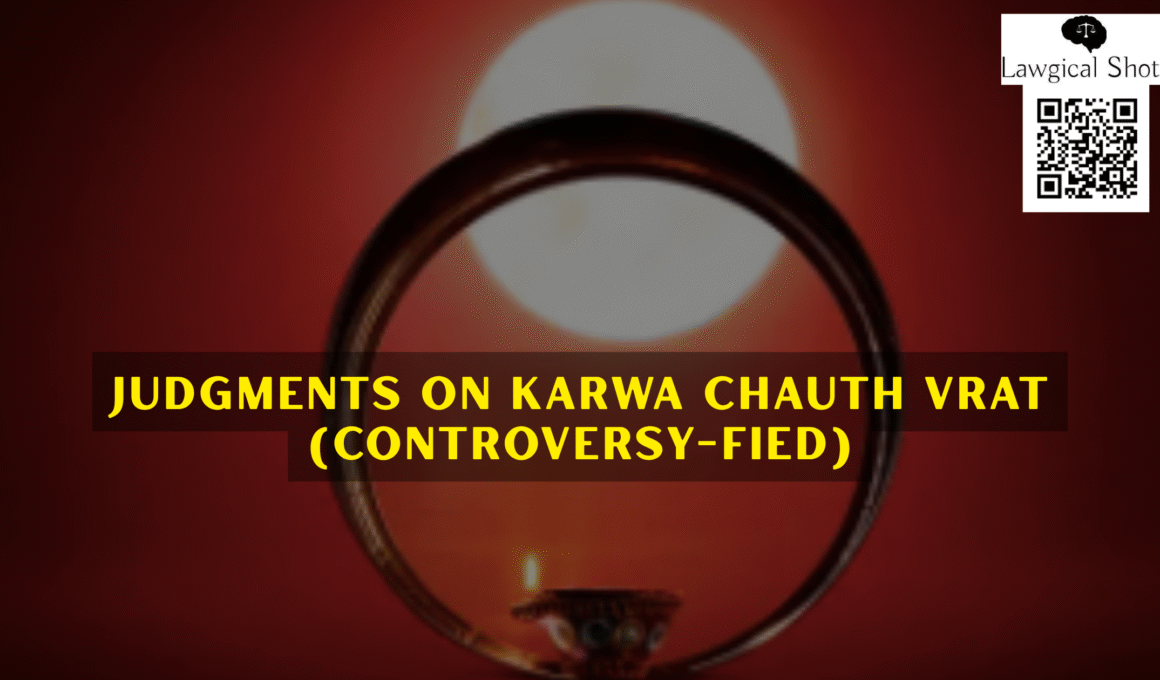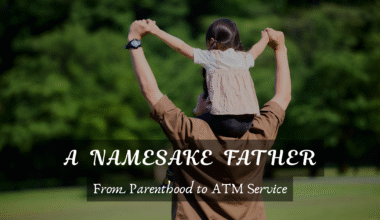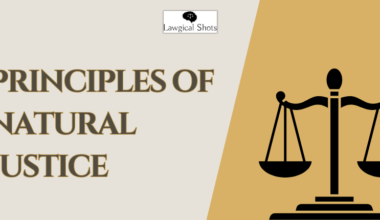Are you confused with the title of this blog? Are you also wondering how and why Karva Chauth Vrat can be a subject of Court judgments? And moreover, how can Karvachauth be related to a legal controversy? Well, the legal word is way too diverse, and everything in this world is subject to legal implications. Then how could a Hindu festival remain unmarked by the laws? To treat your curiosity, here are some judgments of the Supreme Court and High Courts where Karva Chauth Vrat served the bait for solving legal knots in different cases.
Judgments on Karwa Chauth Vrat
While the occasion of Karwa Chauth is more or less confined to matrimonial ties between a husband and wife, legality touches upon different aspects. The connect between divorce cases and Karva Chauth is understandable, but how criminal cases can be resolved through Karwa Chauth Vrat is a surprise for you.
When Karwa Chauth Saree saved the husband and family
Disha Kapoor v. State of Uttar Pradesh (decided on May 8, 2025)
The matter pertained to a high-profile family with the grandfather having served as Governor of a State, and an Uncle holding a Minister’s post in the Government. The High Court had allowed quashing of criminal proceedings in cruelty and dowry cases against 10 people including the husband. The wife appealed against the same.
The Supreme Court while noting contradictions in different statements made by the wife. Once she claimed that she was thrown out of the matrimonial home, but she had also admitted about her husband handing over a cheque of Rs 50,000 on the occasion of Karwa Chauth and Diwali. She admitted the purchase of an expensive saree for Karwa Chauth Vrat, but the same happened after the day she claimed of being thrown out of her matrimonial home, contradicting her own submissions.
Summing up the discrepancies, the Supreme found the case an abuse of process and refused to interfere with the High Court’s quashment of criminal proceedings. While the expense may have gone in vain, the Karwa Chauth Vrat controversy and saree expenses saved the husband a lot of effort.
Karwa Chauth Vrat Declaration For All? Not by Courts
Narender Kumar Malhotra v. Union of India (decided on January 22, 2025)
The Punjab and Haryana High Court dealt with a rather weird Public Interest Litigation which sought declaration of celebration of Karwa Chauth Vrat by women without discrimination. The PIL particularly wanted the right to celebrate the festival by women irrespective of their status of being a widow, separated wife, divorced or a woman in a live-in relationship. The day may be celebrated as festival of good fortunes of women folk or Maa Gaura utsav or Maa Parvati utsav. The PIL further sought directions for Government of India and Haryana to take suitable measures for implementation of law against denial of any group of persons from participation in Karwa Chauth Vrat celebrations in the evening.
While the intent may be positive and inclusive, it ignited Karwa Chauth Vrat controversy. The Court expressed that the subject fell within the domain of legislature, and refused to interfere. While the petitioner prayed for withdrawal of the petition, the Court dismissed it with costs of Rs 1000.
Also explore about 10 Unusual PILs in Supreme Court
No to Karwa Chauth Vrat? Say Yes to Divorce
Dhan Vati v. Satish Kumar (decided on September 19, 2025)
In this case, the Delhi High Court dealt with an appeal against the Family Court granting divorce on the ground of cruelty. The petition for divorce was filed by the husband. The couple got married in 1990, had a son, and the wife allegedly treated her husband with cruelty. She would frequently leave her matrimonial home for prolonged periods. Since Karwa Chauth 2008, she withdrew from marital relations and refused to cohabit as husband and wife unless he transferred demanded properties in her name, and never kept Karwa Chauth Vrat since that year. The instances of abusive behavior, throwing footwear at husband, compelling him to do household chores and even slapping the mother-in-law compelled the husband to seek divorce.
The Court considered the clear abandonment of conjugal obligations by the wife since Karwa Chauth Vrat of 2025. The Delhi High Court held that such deprivation constitutes an extreme form of cruelty. Squarely looking at the compiled facts, the Court found dissolution of marriage on grounds of cruelty as justified.
Beena Nautiyal v. Kamal Kishore Nautiyal (decided on December 18, 2023)
While the Family Court granted divorce to the husband, the wife appealed before the Delhi High Court against the decision. The wife refused to keep her first Karwa Chauth Vrat after marriage, allegedly because the husband failed to get her mobile recharged.
With highlights upon Karwa Chauth Vrat Controversy, the Court observed that:
“fasting or not fasting on Karwachauth may be an individual choice and if dispassionately considered, may not be termed as an act of cruelty. Having different religious beliefs and not performing certain religious duties, per se would not amount to cruelty or would not be sufficient to severe a marital tie.”
However, the High Court focused upon the conduct of wife who refused to do any household chores, picked fights with husband and in-laws. She even removed vermillion, broke bangles and even wore white suit to claim herself a widow after her husband suffered slip-disc. The Delhi High Court concluded that the wife had no respect for her husband or their marital bond. Therefore, considering the Karwa Chauth Vrat controversy and overall facts, the Court found no chance for reconciliation and upheld the divorce decree.
Rekha Drall v. Vikash Drall (decided on September 11, 2023)
The Family Court had granted divorce to the husband on the ground of cruelty. The wife challenged the same before the Delhi High Court. The couple got married in March 2011 and the wife denied any kind of physical or emotional intimacy with her husband. She even demanded a diamond or gold set as a gift before he could touch her. Within a few days, there were clashes over finances, and the wife disclosed her interest in another guy who was disliked by her parents and she was forced into marriage with the husband. Since they had no physical intimacy so far, the wife being pregnant came as a shock, which she later claimed to be a joke.
A few months later, she refused to keep Karwa Chauth Vrat, refusing to recognize him as her husband but only the guy she liked. She also picked fights on Diwali, not allowing the family to perform Laxmi Puja in a peaceful manner. The Court observed that “Such disconnect and constant rejection of any relationship or non acknowledgment of the respondent as a husband is again a source of great mental agony for a husband.” Looking at the overall picture, the Court found no merit in the appeal and refused to interfere with the divorce decree in favour of the husband.
Sister Found Dead: A Karwa Chauth Vrat Controversy
Kans Raj v. State of Punjab (decided on April 26, 2000)
This is a sheer case of how evidence can be interpreted and twisted in criminal cases. A brother went to deliver some customary presents to his married sister on the occasion of Karva Chauth, and found her dead body lying at the entrance, while the family prepared for her cremation. This fact was made in the statement before the court, and the defense contended that there was no Karwa Chauth Vrat on the date of death.
The Court examined the original statement and found that the witness evidence was recorded in Punjabi/Gurmukhi script wherein it was stated that he “had gone to the residence of the accused at the occasion of Karva Chauth (Mauke Te)” and not on the date of Karva Chauth. The Court found that the death occurred under suspicious circumstances. Therefore, the Court found the conviction of the deceased’s husband under Section 304B justified and reduced the sentence to 7 years of rigorous imprisonment.
This one proved to be a real case of Karwa Chauth Vrat Controversy where preparations for longer life of the husband led the evidence for a shortened life of the wife.
Epilogue
India is a land of diverse festivals, cultures, and religions. Karwa Chauth Vrat is just another colourful face of festivities in our country. However, once a brain gets into legal technicalities, there is no coming back! You start applying laws on anything and everything, and scan through the times when Courts were faced with unconventional questions.
This was just another chance fetched to unwrap Karwa Chauth Vrat – controversy, or legality, as it may be perceived. However, as a writer and a researcher, one thing which is a must say is that Courts have to grudge a lot, be it individual interests or societal views, striking a balance is crucial.








